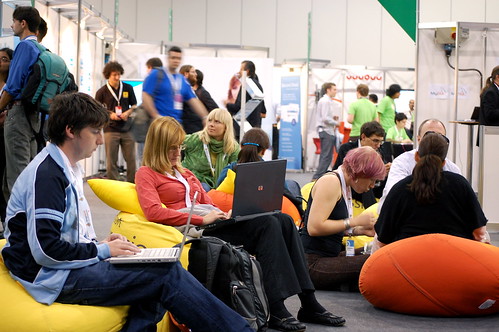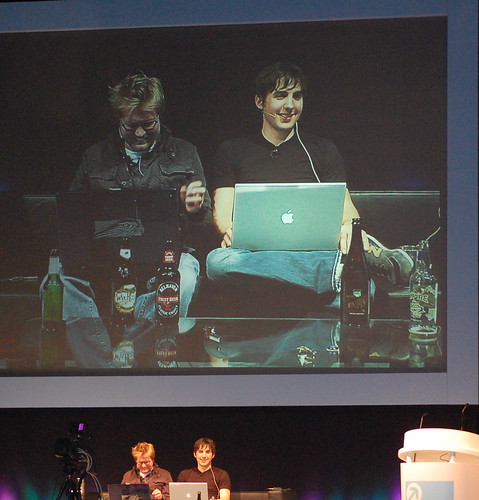The Future Of Web Apps
I just got back home from the Future of Web Apps and I’m tired! (edit: by now it’s one day later; I’m a slow writer) The last 2 days have been so busy, interesting, tiring, fun and at some (rare) moments extremely boring. The event was held at ExCeL London, which I hadn’t visited before (haven’t visited much outside of central London, to be honest). The main annoyance I had with this venue was that planes regularly flew over, disrupting the sessions. For the rest, it was okay. They could have organized the hall a bit better; the two presentation areas were close to each other and the noise from the one was audible in the other. The organizers realized this though and will take it more into account with planning the next event.
I won’t talk about everything I saw and went to, cause 1) that would take ages, 2) some stuff was boring (and no, I’m also not going to complain about them), and 3) I’ve already got trouble remembering what I saw yesterday. I’m only going to touch on some of the interesting issues that were raised and that really stuck with me.

The blind Robin Christophesen had an interesting talk on how to design usable, accessible sites and showed how existing sites were experienced by people with different disabilities/impairments. I never actually stood still on how a blind person would access a website (with a screen reader) and what problems would occur when such a site is not designed that thoroughly. For instance, Amazon’s mainpage doesn’t have any ALT tags to any of the images, including all navigational buttons (like Books, DVD, etc), which results in having the screen reader to say every single very long link. It takes about forever to move beyond the main page!
From the whole talk that Matt Mullenweg from WordPress gave on how to scale every element in your application (techonology, business, etc), one thing kind of surprised me: the way they included ads. Everybody hates ads, but because they do add revenue to your site, you want to include them. What they did was focus the ads only on the people that were one-time users; those people that by accident or through a search engine wound up on the site. They beauty of this is that you don’t annoy your loyal and most probably more experienced, more tech-savvy users, yet still have a source of income.
Another interesting tidbit was raised by Jyri Engestrom from Jaiku. Now Jaiku and Twitter are not real competitors of each other, but on the other side they do some what of the same thing. Jyri likened it to the beginning of the phone networks, when if you had a number with the one provider, you could only phone people with that same provider. Yet now those networks are accessible to each other. Another example is email; even though you have different email service providers, you can still email each other. The next step for Jaiku and Twitter, but also for other types of sites offering the same type of services, is to be able to connect to people in those other networks. I’d never thought about that type of comparison and hope to see that Twitter and Jaiku are compatible one day.

For a long time I’ve wanted to have my parent’s photos printed as a hardcover photo album and surprise them with it. I was going to use iPhoto, but it’s not really that cheap if you only want to do the 1 book. Then yesterday I came across Blurb. They offer a simple app (BookSmart) to create your own book and then publish it for you. If you order more of the same book, you get a discount, but the starting price for just that one book is very reasonable. Next to that, if you want, you can add your book without any additional costs to their bookstore, asking any price for it. Now I won’t want to do that for my personal photo’s, but I can imagine creating cook books or more artistic photo albums. I also loved the possibility to create a blog book; BookSmart can import complete blogs, including the images, layout and comments. How cool is that?
Some other thought-provoking apps were meecard and FireEagle. The idea behind meecard is that you can collect all your web presences into one single website, which you then can easily share with others. Cristiano was working on something similar for his own blogs, so that he only has to put one url on his business cards. FireEagle is an “app” that collects info about your location from various sources (GPS, Plazes, Dopplr, stuff like that) and passes that location through to other applications. This will only become useful once you have enough (real-time) information about you location and once the interesting apps are available.
This blog post wouldn’t be complete without mentioning the live filming of Diggnation. I’ve never watched an episode previously and wasn’t expecting that much of it. I definitely wasn’t expecting the rock-star-like adoration of the crowd! It was just a very weird experience; everyone was cheering and screaming and clapping and whooping. The episode was very funny though and I’ll be checking out some more episodes.

To end this very, very long post it was quite an eventful 2 days and I saw a lot of interesting applications. Somehow these events always motivate me to try and implement my own ideas. Who knows, anyone can come up with the next big thing, right?
